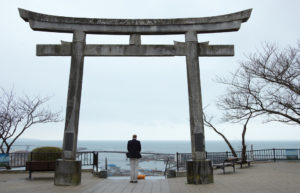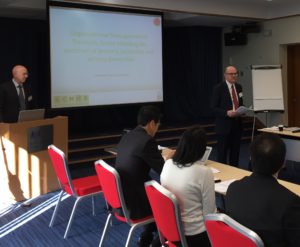3rd March 2017 Tokyo
After the earthquake: sharing experience with Japan on post-disaster mental health support
Due to its position at the end of the Pacific, Japan is a country that is prone to various natural disasters not only earthquakes and tsunami, but also volcanoes, typhoons, floods and mudslides. When I started work in Tokyo, my first meeting was with the security manager to make sure I was prepared and knew what to do if an earthquake strikes (dive under the table and hold on)!
The UK spends approximately £450m (c.0.03% GDP) a year on research directly relevant to international development, including disaster risk reduction. We may have one of the most productive, innovative and high quality research countries in the world, with an outstanding skills base, but international collaboration and knowledge exchange is vital to ensure that global efforts to build disaster resilience are as effective as possible.
Japan is at the forefront of measures on disaster risk reduction, not only for its own national resilience but supporting developing countries in the region. Japan has a reputation for speed rehabilitation of physical infrastructure: the quick repair of the giant sinkhole in Fukuoka gained headlines worldwide. However, mental health support is a different kind of challenge- the damage may be less visible but has real impact on individuals, families and communities.

Over the last 6 months, the British Embassy Tokyo has helped bring UK expertise to add value to Japan’s own plans for rehabilitation after the 2016 Kumamoto earthquake. Our aim has been to learn from each other on building longer-term support systems for mental health.
The 2016 Kumamoto earthquake was characterised by a relatively small number of deaths (around 100 people; compared with18,500 people in Tohoko in 2011) but a very large number of people displaced-more than 12,000 households. In September 2016 (5 months after the earthquake), 37,000 people were still displaced, staying in emergency evacuation centres (such as gyms or schools) or in temporary housing.
Local authorities were quick to dispatch “Disaster Psychological Assistance Teams’ following the earthquake in Kumamoto. Within 24 hours they had teams in place assessing need and have been monitoring groups ever since then, targeting those in greatest need such as those hospitalised, displaced, children, and elderly. After discussion with the local authorities about what support would be most valuable, the British Embassy, with the help of a Tokyo-based UK expert, organised ‘train-the-trainer’ workshops providing post trauma stress management advice for city office staff, volunteer groups and teacher/school groups.
We followed this up by hosting a workshop for UK and Japanese mental health professionals to share experience on supporting people affected by trauma, chaired by Professor Eugene Mullan, University of Exeter. The morning began with two keynote presentations delivered by Professor Neil Greenberg, King’s College London, and Professor Yoshiharu Kim, President of Japan’s National Information Center for Disaster Mental Health, both of whom are internationally renown experts in this field. Other Japanese experts presented their work from a variety of disaster settings. They discussed how to build mental health support systems in the longer term and evidence-based approaches to post-disaster mental health care. Participants highlighted the importance of good and continuous communication following a traumatic event, the need for clear ethical principles for researchers and media who speak to people affected by a disaster and the need for guidance for communities, not just medical professionals. For example, we heard how some people in affected areas were being asked for interviews several times a day by media and researchers. Another example was the successful approach of community picnics where all ages could talk about their experience in an informal setting.

The roundtable and afternoon symposia were well attended with very positive comments about success in bringing the UK and Japanese research communities together and excitement about new opportunities for joint working in both research and training developments. Participants plan to share their discussions with their wider research and practitioner community to develop a roadmap for gathering evidence to inform future guidelines. There is a hope to deliver a much larger UK/Japan conference to disseminate the ideas further and develop the ideas into a concrete plan to enable research and training collaborations to meet this Global Challenge.